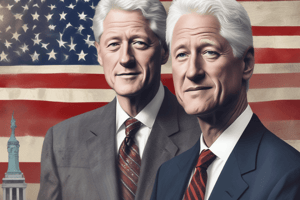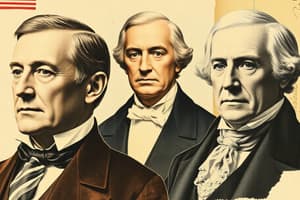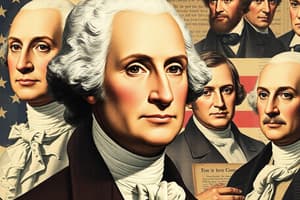Podcast
Questions and Answers
Which president is known as the 'Father of the Constitution'?
Which president is known as the 'Father of the Constitution'?
- Thomas Jefferson
- John Quincy Adams
- James Madison (correct)
- George Washington
What significant policy did James Monroe establish during his presidency?
What significant policy did James Monroe establish during his presidency?
- Emancipation Proclamation
- Monroe Doctrine (correct)
- Panic of 1837
- Indian Removal Act
Which president was in office during the War of 1812?
Which president was in office during the War of 1812?
- John Adams
- Thomas Jefferson
- James Madison (correct)
- James Monroe
What was a major outcome of William Henry Harrison's presidency?
What was a major outcome of William Henry Harrison's presidency?
Which president's actions intensified sectional tensions leading up to the Civil War?
Which president's actions intensified sectional tensions leading up to the Civil War?
Who was president when the U.S. expanded its territory through the Mexican-American War?
Who was president when the U.S. expanded its territory through the Mexican-American War?
Which president faced the Panic of 1837 during his time in office?
Which president faced the Panic of 1837 during his time in office?
Which president is credited with authoring the Declaration of Independence?
Which president is credited with authoring the Declaration of Independence?
Who was the first president to serve non-consecutive terms?
Who was the first president to serve non-consecutive terms?
Which president is known for the establishment of national parks?
Which president is known for the establishment of national parks?
Which president initiated the New Deal during the Great Depression?
Which president initiated the New Deal during the Great Depression?
Who was the president during the Cuban Missile Crisis?
Who was the president during the Cuban Missile Crisis?
Which president expanded civil rights and social programs known as the Great Society?
Which president expanded civil rights and social programs known as the Great Society?
Who was the first president to resign from office?
Who was the first president to resign from office?
Which president is associated with the Marshall Plan after World War II?
Which president is associated with the Marshall Plan after World War II?
Which president's administration was known for numerous scandals?
Which president's administration was known for numerous scandals?
Who led the nation during the Spanish-American War?
Who led the nation during the Spanish-American War?
Which president is known for his focus on human rights and faced an energy crisis?
Which president is known for his focus on human rights and faced an energy crisis?
Flashcards are hidden until you start studying
Study Notes
Early Presidents (1789-1828)
- George Washington (1789-1797): First president; established traditions, including the two-term limit.
- John Adams (1797-1801): Second president; key role in the American Revolution; faced conflicts with France.
- Thomas Jefferson (1801-1809): Third president; authored the Declaration of Independence; completed the Louisiana Purchase.
- James Madison (1809-1817): Fourth president; known as the "Father of the Constitution"; led during the War of 1812.
- James Monroe (1817-1825): Fifth president; Monroe Doctrine formed U.S. foreign policy; era of good feelings.
- John Quincy Adams (1825-1829): Sixth president; son of John Adams; focused on modernizing the economy.
Expansion and Civil War Era (1829-1865)
- Andrew Jackson (1829-1837): Seventh president; founder of the Democratic Party; implemented the Indian Removal Act.
- Martin Van Buren (1837-1841): Eighth president; faced economic depression (Panic of 1837).
- William Henry Harrison (1841): Ninth president; died shortly after taking office.
- John Tyler (1841-1845): Tenth president; annexed Texas; first president to assume office after a president's death.
- James K. Polk (1845-1849): Eleventh president; expanded U.S. territory through the Mexican-American War.
- Zachary Taylor (1849-1850): Twelfth president; died in office; did not address slavery issues.
- Millard Fillmore (1850-1853): Thirteenth president; supported Compromise of 1850.
- Franklin Pierce (1853-1857): Fourteenth president; controversial Kansas-Nebraska Act increased sectional tensions.
- James Buchanan (1857-1861): Fifteenth president; inability to address secession contributed to the Civil War.
- Abraham Lincoln (1861-1865): Sixteenth president; led the nation through the Civil War; issued the Emancipation Proclamation.
Reconstruction to Early 20th Century (1865-1920)
- Andrew Johnson (1865-1869): Seventeenth president; faced impeachment; advocated for lenient Reconstruction policies.
- Ulysses S. Grant (1869-1877): Eighteenth president; focused on Reconstruction and civil rights; administration marred by scandals.
- Rutherford B. Hayes (1877-1881): Nineteenth president; ended Reconstruction; aimed for civil service reform.
- James A. Garfield (1881): Twentieth president; assassinated after a few months in office.
- Chester A. Arthur (1881-1885): Twenty-first president; promoted civil service reform.
- Grover Cleveland (1885-1889, 1893-1897): Only president to serve two non-consecutive terms (22nd and 24th); focused on economic reform.
- William McKinley (1897-1901): Twenty-fifth president; led the nation during the Spanish-American War.
- Theodore Roosevelt (1901-1909): Twenty-sixth president; known for progressive reforms and trust-busting; established national parks.
- William Howard Taft (1909-1913): Twenty-seventh president; later became Chief Justice of the Supreme Court; continued progressive policies.
- Woodrow Wilson (1913-1921): Twenty-eighth president; led through World War I; promoted the League of Nations.
Modern Era (1921-Present)
- Warren G. Harding (1921-1923): Twenty-ninth president; known for scandals during his administration.
- Calvin Coolidge (1923-1929): Thirtieth president; emphasized business and economic growth.
- Herbert Hoover (1929-1933): Thirty-first president; faced the Great Depression.
- Franklin D. Roosevelt (1933-1945): Thirty-second president; initiated the New Deal; served four terms.
- Harry S. Truman (1945-1953): Thirty-third president; post-World War II policies; implemented the Marshall Plan.
- Dwight D. Eisenhower (1953-1961): Thirty-fourth president; focused on Cold War strategies and civil rights.
- John F. Kennedy (1961-1963): Thirty-fifth president; known for the Cuban Missile Crisis and civil rights advocacy.
- Lyndon B. Johnson (1963-1969): Thirty-sixth president; expanded civil rights and social programs (Great Society).
- Richard Nixon (1969-1974): Thirty-seventh president; first to resign from office; Watergate scandal.
- Gerald Ford (1974-1977): Thirty-eighth president; focused on healing post-Watergate; pardoned Nixon.
- Jimmy Carter (1977-1981): Thirty-ninth president; focused on human rights, faced energy crisis.
- Ronald Reagan (1981-1989): Fortieth president; conservative policies, ended the Cold War era.
- George H.W. Bush (1989-1993): Forty-first president; led during the Gulf War.
- Bill Clinton (1993-2001): Forty-second president; known for economic expansion and welfare reform.
- George W. Bush (2001-2009): Forty-third president; led during 9/11 attacks; initiated wars in Afghanistan and Iraq.
- Barack Obama (2009-2017): Forty-fourth president; first African American president; known for the Affordable Care Act.
- Donald Trump (2017-2021): Forty-fifth president; controversial policies and impeachment.
- Joe Biden (2021-present): Forty-sixth president; focuses on pandemic response, climate change, and economic recovery efforts.
Early Presidents (1789-1828)
- George Washington (1789-1797): First president, established foundational traditions including the two-term limit.
- John Adams (1797-1801): Second president, played a pivotal role in the American Revolution, dealt with conflicts arising from the Quasi-War with France.
- Thomas Jefferson (1801-1809): Third president, primary author of the Declaration of Independence, orchestrated the Louisiana Purchase, doubling the size of the U.S.
- James Madison (1809-1817): Fourth president, known as the "Father of the Constitution," led the U.S. during the War of 1812 against Britain.
- James Monroe (1817-1825): Fifth president, formulated the Monroe Doctrine, establishing U.S. foreign policy principles, marked the "Era of Good Feelings."
- John Quincy Adams (1825-1829): Sixth president, son of John Adams, aimed to modernize the economy and infrastructure.
Expansion and Civil War Era (1829-1865)
- Andrew Jackson (1829-1837): Seventh president, founder of the Democratic Party, enforced the Indian Removal Act, leading to the Trail of Tears.
- Martin Van Buren (1837-1841): Eighth president, confronted the Panic of 1837, an economic depression that shaped his single term.
- William Henry Harrison (1841): Ninth president, served the shortest presidency, dying just 31 days after inauguration.
- John Tyler (1841-1845): Tenth president, known for the annexation of Texas, first president to succeed after a predecessor's death.
- James K. Polk (1845-1849): Eleventh president, expanded U.S. territory significantly through the Mexican-American War.
- Zachary Taylor (1849-1850): Twelfth president, died in office; avoided addressing contentious slavery debates.
- Millard Fillmore (1850-1853): Thirteenth president, supported the Compromise of 1850, which attempted to address sectional tensions.
- Franklin Pierce (1853-1857): Fourteenth president, his endorsement of the Kansas-Nebraska Act aggravated existing divisions over slavery.
- James Buchanan (1857-1861): Fifteenth president, failed to prevent secession, contributing to the onset of the Civil War.
- Abraham Lincoln (1861-1865): Sixteenth president, led the nation through the Civil War, issued the Emancipation Proclamation freeing enslaved individuals in rebel states.
Reconstruction to Early 20th Century (1865-1920)
- Andrew Johnson (1865-1869): Seventeenth president, faced impeachment due to his Reconstruction approach which favored leniency.
- Ulysses S. Grant (1869-1877): Eighteenth president, focused on Reconstruction and advancing civil rights but plagued by scandals.
- Rutherford B. Hayes (1877-1881): Nineteenth president, ended Reconstruction and initiated civil service reforms.
- James A. Garfield (1881): Twentieth president, assassinated shortly into his term, highlighting issues of political corruption.
- Chester A. Arthur (1881-1885): Twenty-first president, advocated for civil service reform, achieving some changes.
- Grover Cleveland (1885-1889, 1893-1897): Only president to serve two non-consecutive terms, was committed to economic reform.
- William McKinley (1897-1901): Twenty-fifth president, led America during the Spanish-American War, enhancing U.S. global presence.
- Theodore Roosevelt (1901-1909): Twenty-sixth president, noted for Progressive reforms, trust-busting efforts, and establishing national parks.
- William Howard Taft (1909-1913): Twenty-seventh president, pursued progressive policies and later served as Chief Justice of the Supreme Court.
- Woodrow Wilson (1913-1921): Twenty-eighth president, led the U.S. through World War I and championed the League of Nations.
Modern Era (1921-Present)
- Warren G. Harding (1921-1923): Twenty-ninth president, his administration was marred by scandals, including the Teapot Dome.
- Calvin Coolidge (1923-1929): Thirtieth president, espoused economic growth and business interests.
- Herbert Hoover (1929-1933): Thirty-first president, faced the Great Depression, struggled with economic recovery efforts.
- Franklin D. Roosevelt (1933-1945): Thirty-second president, initiated the New Deal, served four terms, radically reshaping American government role in the economy.
- Harry S. Truman (1945-1953): Thirty-third president, implemented the Marshall Plan for European recovery post-WWII.
- Dwight D. Eisenhower (1953-1961): Thirty-fourth president, focused on Cold War strategies and promoting civil rights.
- John F. Kennedy (1961-1963): Thirty-fifth president, navigated the Cuban Missile Crisis, advocated for civil rights.
- Lyndon B. Johnson (1963-1969): Thirty-sixth president, expanded civil rights legislation and initiated the Great Society social programs.
- Richard Nixon (1969-1974): Thirty-seventh president, resigned amid the Watergate scandal, the first to do so.
- Gerald Ford (1974-1977): Thirty-eighth president, sought national healing after Watergate and pardoned Nixon.
- Jimmy Carter (1977-1981): Thirty-ninth president, focused on human rights issues, faced an energy crisis.
- Ronald Reagan (1981-1989): Fortieth president, adopted conservative policies, played a significant role in ending the Cold War.
- George H.W. Bush (1989-1993): Forty-first president, notable for leadership during the Gulf War.
- Bill Clinton (1993-2001): Forty-second president, known for significant economic expansion and welfare reform.
- George W. Bush (2001-2009): Forty-third president, led the U.S. in response to the 9/11 attacks and initiated military actions in Afghanistan and Iraq.
- Barack Obama (2009-2017): Forty-fourth president, first African American president, recognized for the Affordable Care Act.
- Donald Trump (2017-2021): Forty-fifth president, characterized by controversial policies and two impeachments.
Studying That Suits You
Use AI to generate personalized quizzes and flashcards to suit your learning preferences.




